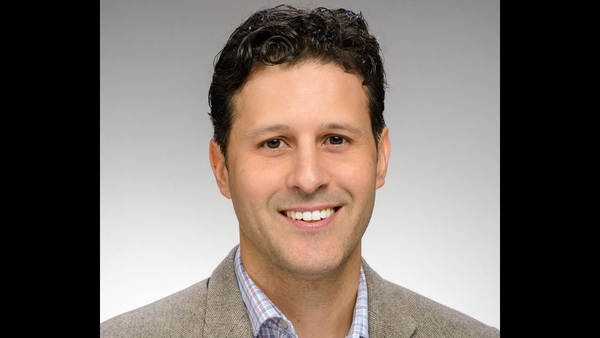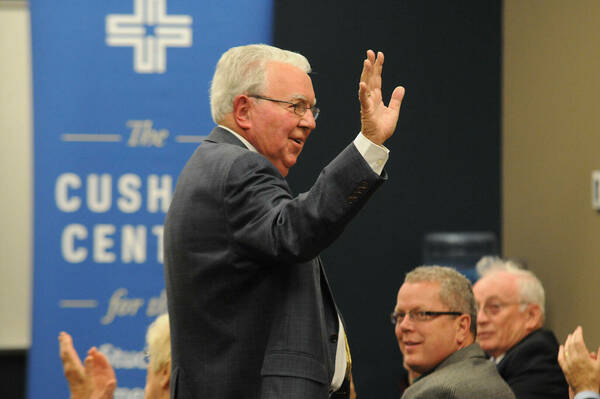
The Cushwa Center’s first year with co-directors has been an exciting one. The fall semester of 2023 was a great success, not least because of our tremendous staff and several excellent events. I am very grateful to be serving in this role alongside Darren Dochuk, whose scholarship and leadership inspire and expand the conversations long facilitated by the Cushwa Center. One of the unique qualities of Cushwa is that these conversations have originated and evolved out of many years of dialogue marked by various friendships and occasions of fellowship. To be part of such discussions about American Catholicism, and American religion more broadly, is truly a privilege.
Renaming our semiannual marquee event, the Jay P. Dolan Seminar in American Religion, honors our founder and continues the conversations he initiated five decades ago. For this note, I take up a point of conversation running through Jay Dolan’s timely work, In Search of an American Catholicism: A History of Religion and Culture in Tension (Oxford 2002). Published soon after the attacks of 9/11, and in the midst of the Boston Globe “Spotlight” team’s reporting on clergy sex abuse, Dolan’s history provided an important intervention on the question of religion in American culture. These two earth-shattering events led many individuals to conclude that clerical abuse and terrorism were inextricably bound up with organized religion and belief in a one true God. New Atheism literature capitalized on this grieving and justly angered ethos of American culture in the 2000s. Today, a rapid disaffiliation of Americans from Christianity is occurring among the nones and the “nonverts,” to use Stephen Bullivant’s apt term considered this spring at our Dolan Seminar in American Religion.
Whereas familiar tropes in the United States often present religion and science, or faith and reason, or church and state in irreconcilable conflict, Dolan’s book took up the theme of tension between cultures as a fruitful alternative. Tension can be met with dialogue and mutual enrichment rather than mere opposition and parochialism. Dolan’s vintage style of social history deployed the category of cultural tradition in order to explore the evolving relationship between U.S. democratic culture and Roman Catholicism, the future of which remained uncertain. He distilled the point of cultural tension succinctly for the Catholic Church after the Second Vatican Council: “the dialogue between Catholic and American cultures has been and continues to be a dialogue between Catholicism and modernity.”

After navigating the two-hundred-year historical tension between modern American democratic values and Roman Catholicism, Dolan concluded his book with a postscript on the sex abuse crisis, prompting him to confront the limitations of dialogue. This cultural turn introduces a useful frame for not only analyzing the tension between church and world, but also addressing conflict within the church and beyond it. Dolan rightly observed that the arrogance, self-protectiveness, and lack of accountability of clerical culture fostered and sustained secrecy, complicity, and deceit among church leaders. The uncertain future of American Catholicism and its credibility, he wagered, rested on whether church leaders could embrace a more democratic model of church governance and drop outdated vestiges of papal monarchy and ultramontanism.
Dolan’s postscript was indeed prescient when we consider Roman Catholicism after the election of Pope Francis in 2013. The first pope from the global South has targeted clericalism as a major obstacle to church reform. Francis frequently cautions against “spiritual worldliness,” a term used by 20th-century French Jesuit theologian Henri de Lubac. Spiritual worldliness, according to de Lubac, is something “infinitely more disastrous” than any moral laxity in the church. Relatedly, Francis has made efforts to overturn clerical culture by decentralizing church governance and empowering the people of God from the pews and the periphery to renew the faith. Although not a democratic (or Gallican or Der Synodale Weg) model of church governance, synodality for Pope Francis deprivileges the monarchical model of leadership outlined by Dolan. Like the Amazon synod in 2019, the 2024 synod on synodality in Rome will raise tensions concerning church leadership, for example, on the subject of women deacons and married clergy.
Pope Francis also focuses on culture to navigate crises in the church and world. Yet his perspective from the global South is not determined by the culture-wars narrative of traditionalism versus progressivism or conservatism versus liberalism. For Francis, the perduring conflict of modernity, beginning with European colonial expansion, is between cultural imperialism and cultural pluralism. Sociologist Robert Bellah identified a similar kind of conflict in the American context between a dominant Protestant (in the radical congregationalist sense) monoculture and genuine cultural diversity. Bellah believed that religion, especially the Black church and Catholicism, were necessary for preserving robust pluralism through the values of solidarity and the common good against the deified market and hyper-individualism. More than a sociological problem, Francis approaches the global technocratic monoculture of today as an anthropological crisis afflicting vulnerable humans and the planet.
Cushwa’s fiftieth anniversary conference in April 2025, titled Catholic Modernity in the Americas: Land, Culture, Politics, will widen the conversation about the dialogue between religion and the modern world so important to Dolan (see the call for papers at cushwa.nd.edu/cma2025). We believe this enduring theme can bring together familiar conversation partners and new ones in the age of Pope Francis. Nevertheless, as Dolan reminds us all, this renewed conversation cannot ignore the tensions and conflicts, both historical and contemporary, that accompany, and sometimes haunt, a Catholic modernity.
David Lantigua
William W. and Anna Jean Cushwa Co-Director
This director’s note appears in the spring 2024 issue of the American Catholic Studies Newsletter.